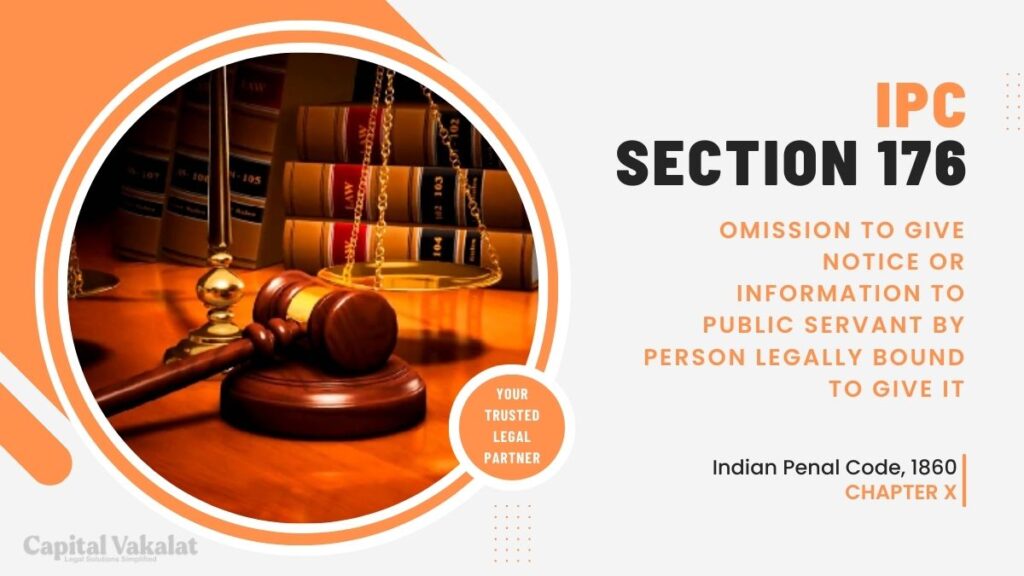In the vast expanse of legal jargon, Section 176 of the Indian Penal Code (IPC) stands as a vital provision that deals with an individual’s legal obligation to provide notice or information to a public servant.

This article delves into the intricacies of Section 176 IPC, exploring its nuances, consequences, and implications for those who are bound by it.
Understanding the Basics
What is Section 176 IPC?
Section 176 of the IPC is a legal provision that stipulates the duty of any person, legally bound to give notice or information to a public servant, to do so. It pertains to specific situations where such information is essential for maintaining law and order or conducting fair investigations.
Who is a Public Servant?
A public servant, as defined in Section 21 of the IPC, includes government employees, officials, and individuals entrusted with public duties. This wide definition covers a vast spectrum of officials who play a crucial role in the functioning of the government and the maintenance of law and order.
Legal Obligations
Legal Duty to Provide Information
This section emphasizes the legal duty imposed on individuals to provide notice or information to a public servant. Failure to do so can have serious consequences.
When is it Applicable?
Section 176 IPC applies in various scenarios, including unnatural deaths, suicides, and accidents. The primary aim is to ensure that public servants have the necessary information to carry out their duties effectively.
Penalties for Non-compliance
Non-compliance with the obligations outlined in this section can lead to legal consequences, including fines or imprisonment. Understanding the repercussions is vital to appreciate the gravity of this legal provision.
Real-life Implications
Unnatural Deaths and Suicides
In cases of unnatural deaths or suicides, it is crucial for individuals with knowledge of such incidents to inform the authorities promptly. Failure to do so can hinder investigations and the pursuit of justice.
Accident Reporting
Accidents, especially those involving injuries or fatalities, necessitate prompt reporting to public servants. Timely reporting can help in the proper allocation of resources for rescue and medical aid.
Legal Safeguards
Protection from False Complaints
Section 176 IPC also provides safeguards to protect individuals from false complaints. It ensures that individuals are not wrongfully accused of withholding information when they were not legally bound to provide it.
Ensuring Accountability
This legal provision promotes accountability among individuals who are in a position to provide crucial information to public servants. It underscores the importance of cooperation with the authorities.
The Human Aspect
Moral and Ethical Responsibility
Beyond the legal obligation, there exists a moral and ethical responsibility for citizens to cooperate with public servants in maintaining law and order. Being proactive in providing information can contribute to a safer society.
Community Well-being
Community well-being is directly linked to the effective functioning of public servants. By fulfilling their duties under Section 176 IPC, individuals play a vital role in contributing to the betterment of society.
Conclusion
Section 176 of the IPC serves as a pillar of the legal framework, highlighting the importance of cooperation between citizens and public servants. It underscores the legal obligations and moral responsibility of individuals to provide information in specific situations. Understanding and adhering to this provision is not just a legal requirement but a step towards building a safer and more responsible society.
Frequently Asked Questions
Are there any exceptions to the duty to provide information to public servants under Section 176 IPC?
Yes, there are exceptions outlined in the provision to protect individuals from false complaints and accusations.
How does Section 176 IPC contribute to maintaining law and order?
By ensuring that public servants have access to essential information, Section 176 IPC aids in maintaining law and order and conducting fair investigations.
Is there a time frame for providing information to public servants under Section 176 IPC?
The section does not specify a strict time frame, but timely reporting is encouraged to facilitate effective actions by the authorities.
What is the importance of community well-being in the context of Section 176 IPC?
Community well-being is closely linked to the effective functioning of public servants, and citizens’ cooperation is essential in this regard.